Sunway Baby Lab

How do babies understand the world around them?
How do they learn to remember faces and understand different emotions and languages?
At Sunway Baby Lab, we conduct baby studies to answer these questions. We are interested to investigate babies’ cognitive development in the area of speech and language development, emotions and face perception.
We are always looking for babies to participate in our studies. Each study has specific age requirement and so we generally recruit babies from 0 – 2 years old to be placed in our database. If you are interested in helping us, please register your baby and we will contact you if your baby is eligible for one of our studies.
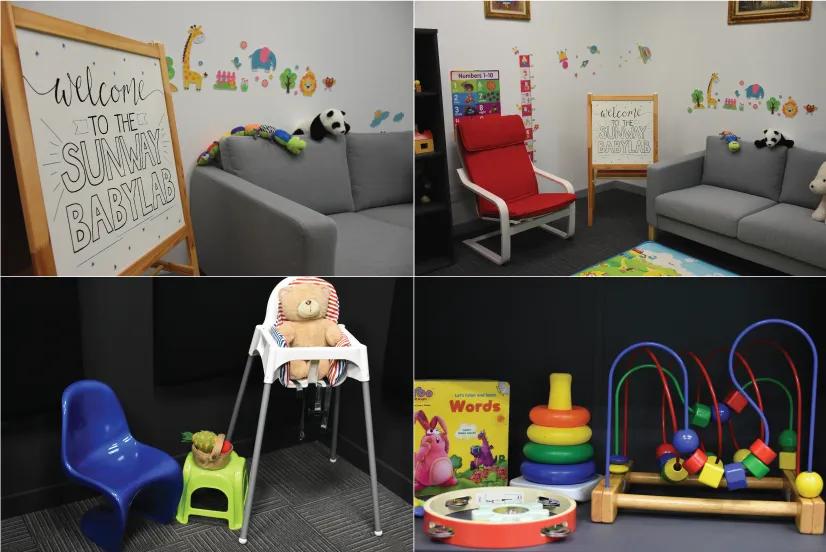
Registration
You can register your baby’s details here
Or alternatively via phone and email:
Contact:
Sunway Baby Lab
Department of Psychology
No. 5, Jalan Universiti, Bandar Sunway,
47500 Selangor.
Tel: 011-56221216
Email: @email
Facebook: Sunway Baby Lab
Sunway Baby Lab Location
Sunway Baby Lab is located on Level 3 (Human Developmental and Human Performance Lab) of the Sunway University New Building.
The address and GPS coordinates are:
Sunway University
No. 5, Jalan Universiti, Bandar Sunway, 47500 Selangor.
GPS Coordinates: 3.0681° N, 101.6041° E
Parking
Paid parking is available at the campus basement car park on a first-come-first-serve basis. We will reimburse your parking fee.
Alternative parking spaces are available at Sunway Pyramid Entry C, Blue Zone. Enjoy a scenic 6-minute walk to Sunway campus via the Elevated Canopy Walk which is located near the main entrance of Sunway Lagoon or at BRT Monash Station, opposite Monash University Malaysia. It is a 5-minute walk via the elevated canopy walk from the station to the University. The latter option is baby-stroller friendly as there are no steps between the two stops. (Please see the map below for directions)
Thank you and see you at Sunway University!
Our Research
Below are some examples of the studies we are currently running:
Infant Tone Perception (Language Study)
Babies may not be able to speak yet, but from the early months of life, infants are learning a lot about speech and language. Each language uses a unique set of speech sounds. Scientists now know that at birth, babies have the ability to distinguish all of these speech sounds, but that ability decreases rapidly if they don’t have regular exposure to those sounds. Woo Pei Jun, Dr Karen Mattock and Elaine Yong are investigating how infants come to recognise, and distinguish between speech sounds in Mandarin and how development may differ for babies growing up hearing more than one language. The focus of the current research is on the perception of Mandarin speech sounds, especially tones. This study is a collaborative project between researcher from Sunway University, Malaysia and University of Western Sydney, Australia. We are currently looking for 4 months and 12 months old babies for this project.
Word Learning Study
Together with Professor Denis Burnham from MARCS Baby Lab at the University of Western Sydney, Australia, Woo Pei Jun from Sunway University is studying how 17 month old infants’ learn pairs of native (Malay Mandarin) and pairs non-native word-like sounds based on tonal (pitch) differences, or phone (consonant or vowel differences). This is one of the many series of studies that we are currently conducting to understanding how babies learn languages from their environment.
Face Perception Study
How do babies perceive faces that they are familiar and unfamiliar with? When do they become experts in recognising faces? Through a series of studies taking place at Lancaster University (United Kingdom) and Sunway University (Malaysia), we are hoping to answer questions like these. Dr Diana Tham and Professor Gavin Bremner, Lancaster University, UK and Woo Pei Jun, Sunway University, Malaysia are conducting a cross-cultural comparison on face perception ability in infants living in a single-race country (e.g., the UK) and a multi-race country (e.g., Malaysia). We are currently looking for 4 months and 9 months old babies for this project.
Emotional development
Infants as young as 3 months are able to recognise specific emotional expressions when the expression is displayed on the face, voice or body posture. To understand how these processes develop, we present infants with a series of photographs, or audio playbacks of various emotions and record their brain responses and eye gaze. This is a joint research project between Sunway University, Prof Ted Ruffman from University of Otago (New Zealand), Assoc Prof Rozainee Khairudin (UKM), and Assoc Prof Alex Schaefer from Monash University Malaysia. We are currently looking for 8 months old babies for this project.
Empathic development
Toddlers around 18 month olds may feel distressed themselves when observing another in distress. But when do infants develop this ability in recognising distress in another, and what are their responses to the distress? Here, we investigate these questions with behavioural observations (e.g. role plays), and physiological (brain responses, eye gaze, salivary cortisol, heart rate). This is a joint research project between Dr Yong from Sunway University and Dr Elena Geangu from Lancaster University (UK). We are looking for 18 months old babies for this project.
How do we study babies?
Behaviour Observation Studies:
These studies are designed to be game-like with your child, for example in role-play. We observe how children respond or interact with the experimenter.
Habituation and Preferential Looking
We use this method to test whether babies can tell the difference between two stimuli (either sounds or images). Babies are played a stimulus until they get bored and look away. If they show renewed interest when a second stimulus is played, this is perceived as they are able to tell the difference between the two.
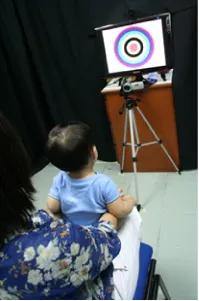
Eye-tracking task;
A special screen and mini-camera tracks a baby's eye movement, telling us where your baby is looking at the screen. By analysing their eye movement, we can understand how they make sense of the world around them.
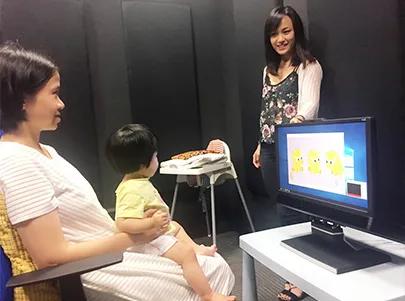
Electroencephalography EEG
EEG measures waves of electricity that the brain generates at all times. We have caps with built in sensors for measuring these waves. With this method, we can see what patterns of brain activity occur when a baby is learning about words, objects or actions.
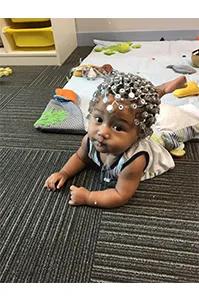
Information for parents
What to Expect?
We generally use non-invasive methods to study babies. Depending on which study your baby is participating in, he/she will listen to some sounds or see some pictures/ videos on a computer screen in a quiet room for 3 - 15 minutes. Your baby will be sitting on your lap or a baby chair during testing and participation is non-invasive. You will be with your baby at all time. Most babies find these studies fun! Studies typically involve one-time visit lasting 30 – 45 minutes to Sunway University. Each task is under 15 minutes but we recommend allocating for an hour, to give the child time to acclimatize to the new environment and people. During the session, we would explain the study to you, answer your questions before you sign a consent form to participate. Then we will proceed to interview you and test your baby. Sometimes you may fill in some questionnaires ahead of time depending on which study you participate. Testing can be done on weekday or weekends (Saturday) between 8.30am – 5.30pm. We will try our best to accommodate your schedule.
Eligibility: Who is eligible?
You and your baby are eligible if
- You are the parent or caregiver of a baby.
- The pregnancy, birth and baby’s development is normal.
- Your baby is below 24 months old.
Risks: Are there any risks involved?
The risks in these studies are minimal. The infants will be exposed to some pictures and some sounds in a quiet room. The sounds are not loud and parents will be with their babies at all times. All studies have received ethical approvals from the university ethics research committee.
Confidentiality
- All sessions will be recorded. The recorded data will be coded and analysed by the research staff. The recorded personal information and record of participation will be kept confidential to the extent permitted by law.
- The analyses will focus on statistical trends that characterise groups of children (for example, girls compared to boys; different age groups of the children), and not on individual children or parents.
Note: No copy of the videos will be given to parents.
Reimbursement
To reimburse you for your time and effort, you will receive the following:
- A RM30 travel allowance on each visit.
- A small baby gift.
- A baby degree on each visit
Bachelor Degree (on 1st visit)
Master Degree (on 2nd visit)
Phd Degree (on 3rd visit)
Register your baby
If you are pregnant or the parent of a baby or toddler and would like to help us with our studies, please register your baby here. When your baby reaches the right age for our studies, we will contact you to invite your child to participate in the study.
Our Researchers:
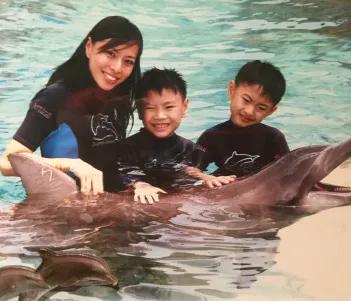
Dr. Woo Pei Jun is a Senior Lecturer at Sunway University, Department of Psychology. She had studied and worked in Malaysia and the United States. She obtained her Bachelors and Master degree in Psychology from Ohio State University and Boston University, USA. She completed her PhD in Psychology with University of Grenoble, Alps, in France. She has years of experience working with children and families in various organisations (South Bay Mental Health (USA), UMMC, Hospital Permai, Sunway Medical Centre) and in private practise in Malaysia. Currently she teaches the psychology undergraduate program at Sunway University and does research in the area of face recognition and language development. She is also author of 4 books on mental health. She has two active boys who are always keen to help in any of the department studies!



